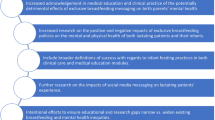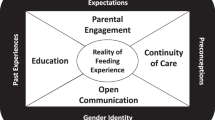Abstract
OBJECTIVE: To describe breastfeeding initiation among 210 urban African-American mothers with inadequate prenatal care.
METHODS:This study is a case–control study of postpartum mothers recruited from four large urban hospitals.
RESULTS: Mothers who chose to breastfeed were more educated, employed before birth, married, and using contraception postnatally. Regression model analysis controlling for demographic differences revealed that breastfeeding was significantly associated with a higher perception of severity of illness and higher confidence in the ability of health care to prevent illness. Breastfeeding mothers were less likely to reverse parent–child roles and had a lower perception of hassle from their infant's behavior. When comparing mothers who breastfed longer than 8 weeks to those who did not breastfeed, breastfeeding mothers had high scores related to empathy toward infants on the Adult–Adolescent Parenting Inventory as well as a low perception of hassle on the Parenting Daily Hassle. The perception of existing formal or informal social support did not influence breastfeeding behavior.
Personal attributes of low-income urban mothers such as health beliefs and parental attitudes may play a role in the initiation and duration of breastfeeding. Low-income African-American mothers may be influenced in their choice to breastfeed by supportive messages from physicians and nurses delivering care to mothers and their newborns. Emphasis should be placed on the role breastfeeding can play in preventing childhood illnesses.
This is a preview of subscription content, access via your institution
Access options
Subscribe to this journal
Receive 12 print issues and online access
$259.00 per year
only $21.58 per issue
Buy this article
- Purchase on Springer Link
- Instant access to full article PDF
Prices may be subject to local taxes which are calculated during checkout
Similar content being viewed by others
References
Grossman LK, Harter C, Sachs L, Kay A . The effect of postpartum lactation counseling on the duration of breast-feeding in low-income women. Am J Dis Child 1990;144:471–474.
National Institute of Medicine SoNDL, Committee on Nutritional Status During Pregancy and Lactation, Food and Nutrition Board. Nutrition during Lactation. Washington, D.C.: National Academy Press; 1991.
Forste R, Weiss J, Lippincott E . The decision to breastfeed in the United States: does race matter?. Pediatrics 2001;108:291–296.
Alexy B, Martin AC . Breastfeeding: perceived barriers and benefits/enhancers in a rural and urban setting. Public Health Nurs 1994;11:214–218.
Janke JR . The incidence, benefits and variables associated with breastfeeding: implications for practice. Nurse Practictioner 1993;18:22–32.
Sullivan J, Jones LC . Breastfeeding adoption by low-income black women. Health Care Women Int 1986;7:295–309.
Kistin N, Benton D, Rao S, Sullivan M . Breast-feeding rates among black urban low-income women: effect of prenatal education. Pediatrics 1990;86:741–746.
Maternal and Child Health Bureau. Child Health USA 2002. Washington, D.C.: Department of Health and Human Services, GPO; 2002.
Timbo B, Altekruse S, Headrick M, Klontz K . Breastfeeding among black mothers: evidence supporting the need for prenatal intervention. JSPN 1996;1:35–40.
Humphreys A, Thompson N, Miner K . Intention to breastfeed in low-income pregnant women: the role of social support and previous experience. Birth 1998;25:169–174.
Locklin MP, Naber SJ . Does breastfeeding empower women? Insights from a select group of educated, low-income, minority women. Birth 1993;20:30–35.
Reifsnider E, Eckhart D . Prenatal breastfeeding education: its effect on breastfeeding among WIC participants. J Hum Lact 1997;13:121–125.
MacGowan RJ, MacGowan CA, Serdula MK, Lane JM, Joesoef RM, Cook FH . Breast-feeding among women, attending women infants and children clinics in Georgia, 1987. Pediatrics 1991;87:361–366.
Kogan MD, Kotelchuck M, Alexander GR, Johnson WE . Racial disparities in reported prenatal care advice from health care providers. Am J Public Health 1994;84:82–88.
Ludington-Hoe S, McDonald P, Satyshur R . Breastfeeding in African American Women. J Nat Black Nurs Assoc 2002;13:56–64.
Grossman LK, Fitzsimmons SM, Larsen-Alexander JB, Sachs L, Harter C . The infant feeding decision in low and upper income women. Clin Pediatr (Phila) 1990;29:30–37.
Bates AS, Fitzgerald JF, Wolinsky FD . Reliability and validity of an instrument to measure maternal health beliefs. Med Care. 1994;32:832–846.
Bavolek S . Handbook for the Adult–Adolescent Parenting Inventory (AAPI). Scharnburg, IL: Family Development Associates; 1984.
Bristol M . A series of studies of social support, stress and adaptation in families of developmentally disabled children. Paper presented at: Biennial Meeting of the Society for Research in Child Development, Toronto; 1985.
Bristol M, Schopler E . Stress and coping in families of autistic adolescents. In: Schopler E, Mesibov G, editors. Autism in Adolescents and Adults. New York: Plenum; 1984. p. 251–278.
Crnic KA, Greenberg MT, Ragozin AS, Robinson NM, Basham RB . Effects of stress and social support on mothers and premature and full term infants. Child Dev. 1983;54:209–217.
Katz KS, El-Mohandes AE, McNeely-Johnson D, Jarrett M, Rose A, Cober M . Retention of low income mothers in a parenting intervention study. J Community Health 2001;26:203–218.
Raisler J, Alexander C, O'Campo P . Breast-feeding and infant illness: a dose–response relationship? Am J Public Health 1999;89:25–30.
Ryan AS, Pratt WF, Wysong JL, Lewandowski G, McNally JW, Krieger FW . A comparison of breast-feeding data from the National Surveys of Family Growth and the Ross Laboratories Mothers Surveys. Am J Public Health. 1991;81:1049–1052.
Jacobson SW, Jacobson JL, Frye KF . Incidence and correlates of breast-feeding in socioeconomically disadvantaged women. Pediatrics 1991;88:728–736.
Bluestein D, Rutledge CM . Psychosocial determinants of late prenatal care: the Health Belief Model. Fam Med 1993;25:269–272.
Stout AE . Prenatal care for low-income women and the Health Belief Model: a new beginning. J Community Health Nur 1997;14:170–179.
Gielen AC, Faden RR, O'Campo P, Paige DM . Determinants of breastfeeding in a rural WIC population. J Hum Lact 1992;8:11–15.
O'Campo P, Faden RR, Gielen AC, Wang MC . Prenatal factors associated with breastfeeding duration: recommendations for prenatal interventions. Birth 1992;19:195–201.
Bevan ML, Mosley D, Solimano GR . Factors influencing breast feeding in an urban WIC program. J Am Diet Assoc 1984;84:563–567.
Milligan RA, Pugh LC, Bronner YL, Spatz DL, Brown LP . Breastfeeding duration among low income women. J Midwifery Womens Health 2000;45:246–252.
Pugh LC, Milligan RA, Frick KD, Spatz D, Bronner Y . Breastfeeding duration, costs, and benefits of a support program for low-income breastfeeding women. Birth 2002;29:95–100.
Din-Dzietham R, Hertz-Picciotto I . Infant mortality differences between whites and African Americans: the effect of maternal education. Am J Public Health 1998;88:651–656.
Acknowledgements
Other participating researchers were Melissa Burroughs, MA, Linda Diamond, MA, Marian H. Jarrett, EdD, Doris McNeely Johnson, PhD, Kathy S. Katz, PhD, Allison Rose, BA, Susan Schneider, MPH, Davene White, RN, NNP and Roberta Bell, RN. We thank Pragathi S.R. Katta, MPH for his editorial help. This work was supported by grants (Ul8-HD30445, Ul8-HD30447, Ul 8-HD30454, UH18-HD30458, UH18-HD30463, and from the NICHD and NIH ORMH).
Author information
Authors and Affiliations
Appendix
Appendix
This study was supported by a Cooperative Agreement funded by the NIH Office of Research on Minority Health and The National Institute of Child Health and Human Development. The following institutions and investigators participated in the NIH-DC Initiative to Reduce Infant Mortality in Minority Populations in the District of Columbia. The Children's National Medical Center — M. Pollack (principal investigator); The D.C. Commission of Public Health — B.J. Hatcher (principal investigator); D.C. General Hospital — L. Johnson (principal investigator); Georgetown University Medical Center — K.N. Siva Subramanian (principal investigator); Howard University — B.D. Wesley (principal investigator); The University of the District of Columbia — V. Melnick (principal investigator); The Research Triangle Institute — A.V. Rao (principal investigator); The NICHD — H.W. Berendes (Program Officer), A. Herman (Scientific Coordinator), B.K. Wingrove (Project Coordinator). Other participating institutions were The George Washington University Medical Center — A.A.E. El-Mohandes (principal investigator) and Columbia Hospital for Women — L. Grylack (principal investigator).
Rights and permissions
About this article
Cite this article
Sharps, P., El-Mohandes, A., Nabil El-Khorazaty, M. et al. Health Beliefs and Parenting Attitudes Influence Breastfeeding Patterns Among Low-income African-American women. J Perinatol 23, 414–419 (2003). https://doi.org/10.1038/sj.jp.7210948
Published:
Issue Date:
DOI: https://doi.org/10.1038/sj.jp.7210948



